List of English dishes
This is a list of prepared dishes characteristic of English cuisine. English cuisine encompasses the cooking styles, traditions and recipes associated with England. It has distinctive attributes of its own, but also shares much with wider British cuisine, partly through the importation of ingredients and ideas from North America, China, and India during the time of the British Empire and as a result of post-war immigration.[1][2]
Ingredients that might be used to prepare these dishes, such as English vegetables, cuts of meat, or cheeses do not themselves form part of this list.
English dishes
| Name | Image | First known | Savoury/ Sweet |
Region | Description |
|---|---|---|---|---|---|
| Bedfordshire clanger |  |
1800s (century)[3] | Savoury and Sweet | Bedfordshire | Suet crust dumpling with a savoury filling one end, sweet filling the other. The savoury filling is usually meat with diced potatoes and vegetables. The sweet filling can be jam, cooked apple or other fruit. |
| Bangers and mash | 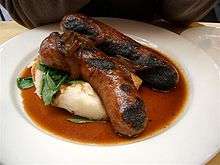 |
410 at latest (Roman Britain: sausages)[4][5] | Savoury | National[6] | Mashed potatoes and sausages, sometimes served with onion gravy or fried onions. |
| Chicken tikka masala |  |
1900s (century)[7] | Savoury | National[6] | Pieces of chicken tikka in a spiced creamy sauce |
| Cobbler | .jpg) |
1800s (century), perhaps earlier[8] | Savoury or Sweet | National, from British American colonies | Fruit or savoury (e.g. beef) filling, covered with a scone mixture and baked |
| Beef Wellington |  |
1939[9] | Savoury | National, from Wellington, New Zealand?[10] | Beef cooked in a pastry crust |
| Black peas | Savoury | Lancashire | Purple podded peas soaked overnight and simmered until mushy | ||
| Black pudding |  |
800BC (in The Odyssey)[11] | Savoury | National[lower-alpha 1] | Blood sausage |
| Bubble and squeak |  |
Savoury | National[6] | Fried mashed potato with cabbage | |
| Cauliflower cheese | 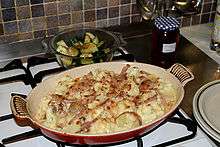 |
Savoury | National | Cauliflower in a thick cheese sauce | |
| Cottage pie, Shepherd's pie |
|
1791[12] | Savoury | National | Meat, minced or in pieces, with mashed potato crust |
| Cumberland sausage | 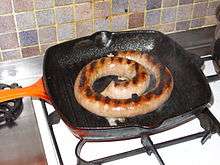 |
Savoury | Cumberland | Long sausage | |
| Devilled kidneys | 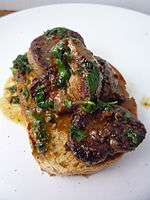 |
Savoury | National [13][14] | ||
| Faggots | 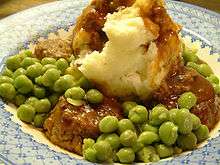 |
1851[15] | Savoury | Midlands | |
| Fish and chips | 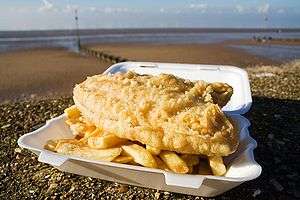 |
1870 approx.[16] | Savoury | National[6][17] | White fish fillets in batter (or egg-and-breadcrumbs), deep fried with potato chips |
| Full English breakfast | |
1861[lower-alpha 2][18] | Savoury | National | A selection of fried foods such as sausages, bacon, eggs, mushrooms, bread, tomatoes; options include kippers, baked beans |
| Game pie |  |
Savoury | National | ||
| Hog's pudding | Savoury | Devon, Cornwall | |||
| Jellied eels | |
Savoury | East End of London | ||
| Kippers | |
Savoury | National | Smoked split herrings | |
| Lancashire hotpot | 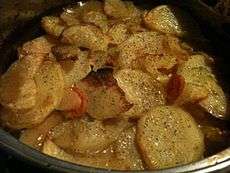 |
Savoury | Lancashire | Meat stew with carrots, potatoes, onions | |
| Lincolnshire sausage |  |
Savoury | Lincolnshire | ||
| Liver and onion/Liver and bacon | 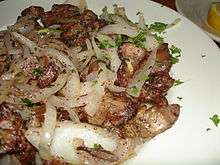 |
Savoury | National | Pictured is liver and onions | |
| Pasty | 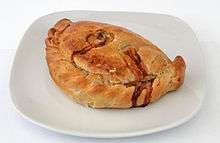 |
1200s (century)[19] | Savoury | Cornwall, National | Pastry shell filled with meat and potatoes |
| Pease pudding |  |
Savoury | National | Split peas or lentils cooked until soft and thick | |
| Pie and mash |  |
Savoury | National | ||
| Ploughman's lunch |  |
Savoury | National | Bread, cheese, apple, pickles | |
| Pork pie |  |
1780s[20][21] | Savoury | Melton Mowbray, National | Cylindrical pie filled with pork and meat jelly |
| Potted shrimps | 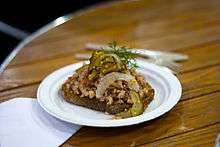 |
1800s (century) or earlier[22] | Savoury | Lancashire (Morecambe Bay) | Shrimps preserved under melted butter |
| Rag pudding |  |
Savoury | Lancashire (Oldham) | Minced meat with onions in a suet pastry, which is then boiled or steamed. | |
| Stargazy Pie |  |
1900s (century) | Savoury | Cornwall | Fish pie with sardines poking out of the piecrust, looking at the stars |
| Steak pies with ingredients such as ale, kidney, oysters, potato and root vegetables |
 |
1303[23] | Savoury | National | Meat and gravy in a pastry shell. Steak and kidney pie is a national dish of the United Kingdom.[6] |
| Steak and kidney pie, see Steak pies | |||||
| Steak and kidney pudding | 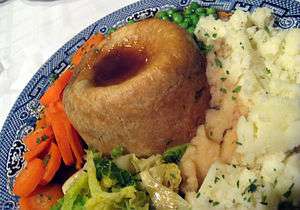 |
1861[24] | Savoury | National | Suet pudding filled with pieces of beef and kidney in thick gravy |
| Steak and oyster pie, See Steak pies |  |
||||
| Stottie cake | |
Savoury | North East England | Heavy flat bread | |
| Suet pudding | 1714[25][26] | Savoury or sweet | National | Steamed pudding made with flour and suet, with meat or fruit mixed in | |
| Sunday roast |  |
1700s (century) | Savoury | National | Roast beef 1700s,[27] Yorkshire pudding (1747),[28] roast potatoes, vegetables. Roast beef with Yorkshire pudding is a national dish of the United Kingdom.[6] |
| Roast lamb with mint sauce | Savoury | National | |||
| Roast pork with apple sauce | Savoury | National | |||
| Shepherd's pie, see Cottage pie | |||||
| Toad-in-the-hole | 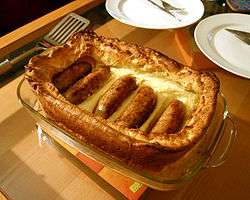 |
1747;[29] 1788[30] 1891[31] | Savoury | National[6] | Sausages cooked in a tray of batter |
| Welsh rarebit |  |
Savoury | National | Melted cheese on toast | |
| Yorkshire pudding | 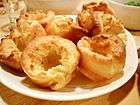 |
1747[28] | Savoury | National | Souffle batter baked in very hot oven. |
| Game pie | Savoury | National | |||
| Panackelty | Savoury | North East England | Slow-baked meat and root vegetables | ||
| Parmo | .jpg) |
Savoury | Middlesbrough | Chicken or other cutlet in breadcrumbs | |
| Scouse | 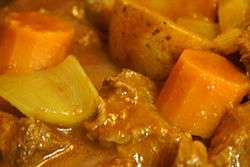 |
1706[32] | Savoury | Liverpool and other seaports, from Northern Europe | Lamb or beef stew with potatoes, carrots and onions, cf Norwegian lapskaus |
| Apple pie | 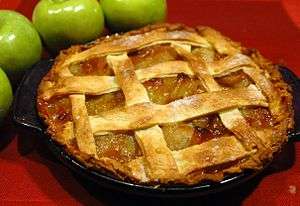 |
1390[33] | Sweet | National[lower-alpha 3] | A pie crust, whether all round or only on top, with a filling of sweetened apple |
| Bakewell tart | 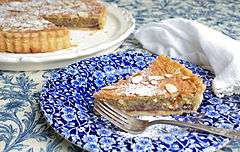 |
1900s (century)[34] | Sweet | Derbyshire | Pastry shell filled with almond-flavoured sponge cake on a thin layer of jam. Developed from 1826 Bakewell pudding[35] |
| Banoffee pie |  |
Sweet | Hungry Monk Restaurant, East Sussex | Pastry shell filled with bananas, cream and toffee | |
| Battenberg Cake | |
Sweet | National | ||
| Bread and butter pudding | 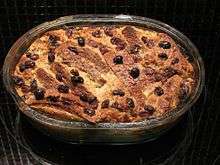 |
Sweet | National | ||
| Christmas pudding | |
Sweet | National | ||
| Crumble | 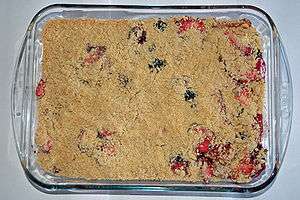 |
Sweet | National | ||
| Eccles cake |  |
1793[36] | Sweet | Greater Manchester | Flaky pastry with butter and currants |
| Eton Mess |  |
1800s (century)[37] | Sweet | Berkshire (Eton College) | |
| Eve's pudding |  |
Sweet | National | ||
| Fool | 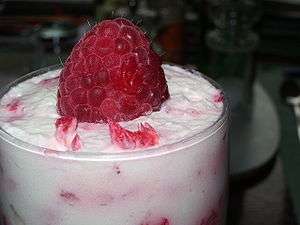 |
Sweet | National | ||
| Gypsy tart | .jpg) |
Sweet | National | ||
| Cornish Hevva Cake |  |
Sweet | Cornwall | ||
| Jam Roly-Poly | Sweet | National | |||
| Knickerbocker glory | 1920s[38] | Sweet | National; possibly from New York[38] | Ice cream sundae in a tall glass, often with nuts, fruits, meringue, and chocolate sauce; served with whipped cream and a glace cherry | |
| Lardy cake | 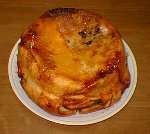 |
Sweet | |||
| Madeira cake |  |
Sweet | National | ||
| Mince pie | 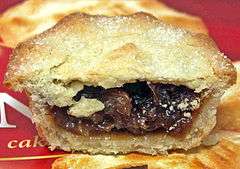 |
Sweet | National | Usually small pastry shells filled with sweet mincemeat; since Early Modern times actual meat omitted | |
| Parkin | 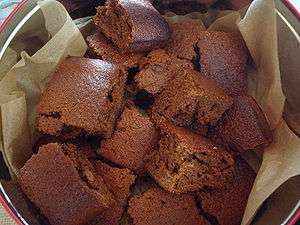 |
Sweet | |||
| Pound cake | 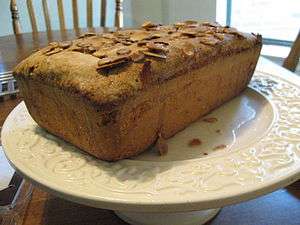 |
Sweet | National | ||
| Queen of Puddings | 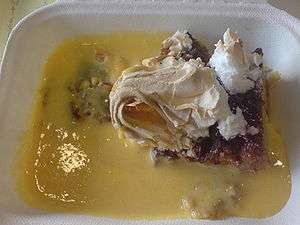 |
Sweet | National | ||
| Saffron cake |  |
Sweet | National | ||
| Scones |  |
Sweet | National, from Scotland | Small bread-like cakes often with raisins | |
| Spotted dick | 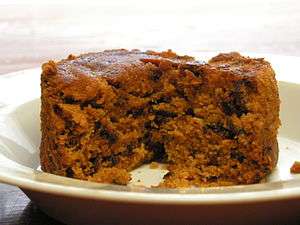 |
1800s (century)[39] | Sweet | National | Pudding with suet pastry and dried vine fruits, usually served with custard |
| Sticky toffee pudding | 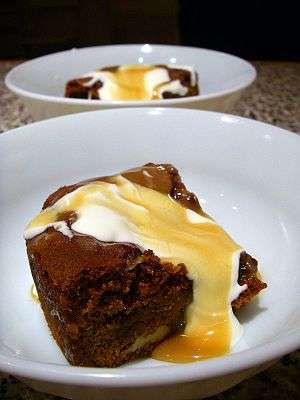 |
Sweet | National | ||
| Summer pudding | 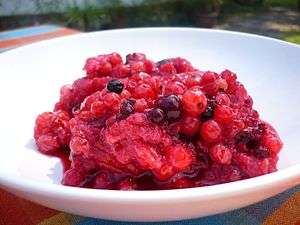 |
Sweet | National | ||
| Sussex Pond Pudding | 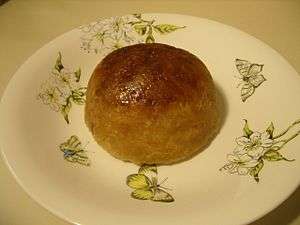 |
Sweet | |||
| Syllabub |  |
Sweet | National | Cold dessert made with cream, alcohol and sugar, often with citrus flavouring | |
| Trifle | 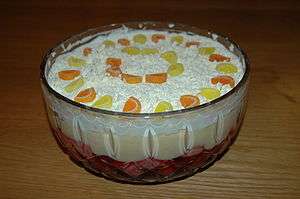 |
Sweet | National | Cold dessert with varied ingredients, often sponge fingers and fortified wine, jelly, custard, and whipped cream, usually in layers | |
| Treacle tart | 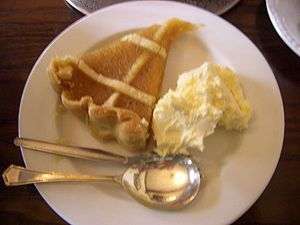 |
Sweet | National | Pastry shell filled with thick sweet treacle mixture | |
| Victoria Sponge Cake | .jpg) |
Sweet | National |
See also
Notes
- ↑ But also traditional across Europe in both Latin and Germanic countries from Portugal in west to Lithuania in east, and from Italy in south to Sweden in north.
- ↑ Date is for Mrs Beeton's book, but not exactly the breakfast eaten today.
- ↑ Apple pies are also found in North America, Netherlands, Germany, Scandinavia.
References
- ↑ Panayi, Panikos (2010 [2008]) Spicing Up Britain. London: Reaktion Books. ISBN 978-1-86189-658-2
- ↑ Dickson Wright, Clarissa (2011) A History of English Food. London: Random House. ISBN 978-1-905-21185-2.
- ↑ "How do you cook a proper Bedfordshire Clanger?". Bedfordshire on Sunday. 13 April 2014. Retrieved 2 February 2016.
- ↑ Hickman, Martin (30 October 2006). "The secret life of the sausage: A great British institution". The Independent. Retrieved 15 April 2015.
- ↑ "Sausage Varieties". Northampton NN3 3AJ, United Kingdom: Sausage Links. 5 December 2013. Archived from the original on 13 January 2014. Retrieved 6 February 2014.
It is estimated that there are around 400 sausage varieties available in the UK.
- 1 2 3 4 5 6 7 Minahan, J.B. (2009). The Complete Guide to National Symbols and Emblems [2 Volumes]. ABC-CLIO. p. 563. ISBN 978-0-313-34497-8.
- ↑ Grove, Peter; Grove, Colleen (2008). "Is It or Isn't It? (The Chicken Tikka Masala Story)". Retrieved 16 November 2015.
- ↑ "Cobbler". ifood.tv. Retrieved 2 February 2016.
- ↑ Hyslop, Leah (21 August 2013). "Potted histories: Beef Wellington". The Telegraph. Retrieved 2 February 2016.
- ↑ Dickson Wright, Clarissa, and Scott, Johnny "Sunday Roast" Kyle Cathie Limited, 2006, p26.
- ↑ "Traditional Black Pudding". English Breakfast Society. 4 January 2014. Retrieved 2 February 2016.
- ↑ "Cottage pie". Oxford English Dictionary. Retrieved 2 February 2016.
- ↑ Meyer, E. (2010). 1200 Traditional English Recipes. Bod Third Party Titles. p. 112. ISBN 978-3-86195-289-3. Book first published in 1898.
- ↑ O'Connor, K. (2013). The English Breakfast: The Biography of a National Meal, with Recipes. Bloomsbury Publishing. p. 317. ISBN 978-0-85785-491-9.
- ↑ Oxford English Dictionary, citing Henry Mayhew.
- ↑ Panayi, 2010. Pages 16–17
- ↑ Jurafsky, D. (2014). The Language of Food: A Linguist Reads the Menu. W. W. Norton. p. pt5. ISBN 978-0-393-24587-5.
- ↑ Dickson Wright, 2011. Page 284
- ↑ Nuttall, P. Austin (1840). A classical and archæological dictionary of the manners, customs, laws, institutions, arts, etc. of the celebrated nations of antiquity, and of the middle ages. Whittaker and Co, and others. p. 555.
- ↑ "History of Melton Mowbray Pork Pie". Melton Mowbray Pork Pie Association. Retrieved 15 April 2015.
- ↑ Wilson, C. Anne (June 2003). Food and Drink in Britain: From the Stone Age to the 19th Century. Academy Chicago Publishers. p. 273.
- ↑ Cloake, Felicity (20 July 2011). "How to cook perfect potted shrimps". The Guardian. Retrieved 2 February 2016.
- ↑ "FAQs: pie & pastry". Food Timeline. Retrieved 2 February 2016. citing Oxford English Dictionary
- ↑ Cloake, Felicity (1 March 2012). "How to cook the perfect steak and kidney pudding". The Guardian. Retrieved 16 May 2015.
- ↑ Lehmann, Gilly (2003). The British Housewife. Totnes: Prospect Books. pp. 83, 198–199.
- ↑ Kettilby, Mary (1714). A Collection of above Three Hundred Receipts in Cookery, Physick and Surgery; For the Use of all Good Wives, Tender Mothers, and Careful Nurses. Richard WIlkin.
- ↑ "Why do the French call the British 'the roast beefs'?". BBC. 3 April 2003. Retrieved 16 May 2015.
- 1 2 Glasse, Hannah (1998) [1747]. The Art of Cookery Made Plain and Easy. Applewood Books. ISBN 978-1-55709-462-9.
- ↑ Glasse, Hannah (1747) The Art of Cookery has "pigeons in a hole".
- ↑ Richard Briggs (1788) The English Art of Cookery has "Toad in a Hole", page 175
- ↑ (Artusi, Pellegrino (1891) La scienza in cucina e l'arte di mangiare bene has "toad in the hole".
- ↑ lobscouse in Merriam-Webster
- ↑ The Forme of Cury, XXIII. "For to Make Tartys in Applis". England, c. 1390
- ↑ "The History of the Bakewell Pudding". Bakewellonline.co.uk. Retrieved 1 February 2016.
- ↑ Davidson, Alan (2014). The Oxford Companion to Food. Oxford University Press. p. 54. ISBN 0199677336.
- ↑ "The history behind (and recipe for) Eccles Cakes". Salford City Council. Retrieved 2007-04-10.
- ↑ Arthur Henry Beavan (1896). "Marlborough House and Its Occupants: Present and Past": 162.
- 1 2 "Knickerbocker Glory". The Foods of England Project. Retrieved 18 February 2016.
- ↑ Ayto, John (2012). The Diner's Dictionary: Word Origins of Food and Drink. Oxford University Press. p. 349. ISBN 978-0-19-964024-9.
Sources
- Ayrton, Elisabeth (1974) The Cookery of England: being a collection of recipes for traditional dishes of all kinds from the fifteenth century to the present day, with notes on their social and culinary background. London: Andre Deutsch.
- Ayrton, Elisabeth (1980) English Provincial Cooking. London: Mitchell Beazley.
- Grigson, Jane (1974) English Food. London: Macmillan. Enlarged edition 1979 (ISBN 0-333-26866-0); later editions Ebury Press with foreword by Sophie Grigson.
- Dickson Wright, Clarissa (2011) A History of English Food. London: Random House. ISBN 978-1-905-21185-2.
- Hartley, Dorothy (1954) Food in England. London: Macdonald (reissued: London: Little, Brown, 1996, ISBN 0-316-85205-8)
- Lehmann, Gilly (2003) The British Housewife. Totnes: Prospect Books.
- Panayi, Panikos (2010 [2008]) Spicing Up Britain. London: Reaktion Books. ISBN 978-1-86189-658-2.
This article is issued from Wikipedia - version of the 11/28/2016. The text is available under the Creative Commons Attribution/Share Alike but additional terms may apply for the media files.